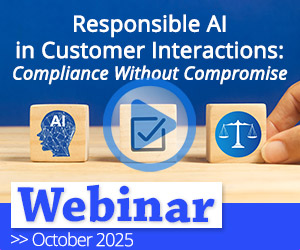Megan Haas of Interactions discusses three key misconceptions of artificial intelligence (AI) and instead shares the reality of each situation.
Every now and again, a technology comes around that completely changes the way that business is done.
From Henry Ford’s assembly line, to the commercialization of the internet, and the introduction of social media, companies have learned the hard way that if they don’t adapt, they will get left behind.
Think back to 10 years ago when social media was becoming mainstream. Companies who had not made brand profiles were quickly scrambling to make a social presence or risk being forgotten about.
Fast-forward to today, almost every B2C company has a dedicated social team. It’s being taught in colleges. The fear of the unknown around the concept has disappeared as its adoption has been normalized.
AI will be no different. Right now, AI is a strange, unknown concept to many.
As Rob Atkinson says in The ConversAItion podcast: “Right now, AI—it’s like magic. It’s this weird elixir. You don’t know what it is, and yet it’s not all that complicated. But most people, they have so little knowledge of it that it becomes a source of fear.”
We may not even realize now how much AI will be a part of our everyday lives in the future. And not the far-off future either, but in a matter of several years.
The truth is that if companies fail to adapt now, they will get left behind. Those who make the leap and implement the technology in a way that supports their customers and business mission will see tremendous results.
Especially when it comes to Conversational AI in customer experience, the benefits drastically outweigh the costs, and the potential fears.
Misconception: It will cost a lot.
Reality: Financially, it’s the best move.
Like with any new technology, the cost and justification of it can be the biggest hurdle. Rightfully so, many are sceptical to implement new technologies. What if they don’t work? What if it costs more to run than it saves? What if something better comes out?
Luckily, while AI is still relatively new, there has been more than enough evidence to support its ROI. Especially in regards to its effectiveness in customer experience, Conversational AI can automate simple, repetitive tasks that take up a lot of a human agent’s time.
By doing this, agents can continue handling tasks that require an actual human, while all additional calls can be handled completely through the intelligent virtual assistant (IVA). This means no wait times for customers calling, even if there is a higher volume than usual, and no more need for additional agents to account for those call volume spikes.
The result? A lot more happy customers, and happy agents.
Misconception: AI will take away jobs.
Reality: Automation isn’t taking away jobs, it’s creating them.
The concept that technology takes jobs away from humans isn’t new. Whenever a new technology comes around, a fear always emerges that it will make jobs irrelevant.
The truth? Technology disrupts jobs, but it doesn’t eliminate them. In fact, by increasing productivity, often more jobs of higher value are created, like during the industrial revolution.
Especially in customer service jobs, such as live agents in a contact center, AI will handle the repetitive, mundane tasks, which will create a more valuable and interesting job for the human agents. This will not only reduce agent churn, but will allow many more customers be helped.
Misconception: It’s too new.
Reality: AI isn’t something to fear, it’s something to embrace.
As mentioned earlier, the fear of the unknown, whether around the internet, social media, or AI, often results in companies becoming late adopters to technology that would have been beneficial to have years earlier.
It’s not always the right choice to jump on bandwagons due to the hype, but the data shows clear and compelling business results from AI implementation that should not be ignored.
It may not be fully understood for a number of years by most of the population, but AI is a technology, just like any other technology, that has a specific purpose and benefit to businesses.
Because it has not been around for long, it can be difficult to conceptualize the scope of what the technology can – and can’t – do.
As school curriculums alter to include more education around AI and computer science, and those in the workforce become more accustomed to hearing about AI and its benefits, it will become more clear that applied AI is essential for businesses to succeed.
In a matter of years, AI will be mainstream and those who did not adopt the technology early enough will see the implications. In the future, our world will be at a point where AI is all around us.
When this happens, rather than misunderstood, it will be essential to the way that business is done.
Many businesses years ago could not have predicted the impact that social media has had on their sales. In fact, some businesses exist solely because of the platform that social media creates.
AI will be no different. Without it, many businesses will struggle. With it, businesses will see tremendous business results and ask the question, “how did we ever survive without this?”
Author: Guest Author
Published On: 27th Sep 2019 - Last modified: 2nd Oct 2019
Read more about - Guest Blogs, Interactions















